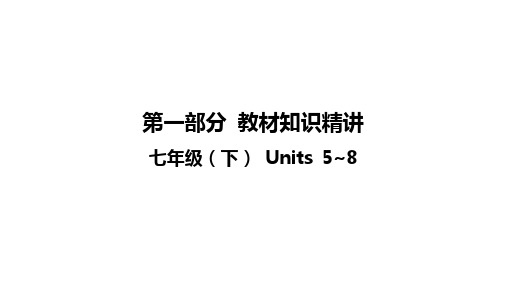七年级英语下unit5-8复习讲义
英语七年级下人教新课标Unit5-8知识梳理复习课件

2. do one’s homework = do homework (做家庭作业) 3. a. 看电视/比赛用“watch”; b. 看书/报纸/杂志用“read”; 4. wait for….(等候….) 5. TV show (电视节目) 6. at school/home/work (在学校/家/工作) 7. Make telephone calls (打电话) a. Hello, here is/it’s + 电话号码 (你好!这儿是…) b. Hello, may/can/could I speak to…,please? (你好,我可以与……通话吗?) c. Who’s that (speaking) ? (你是谁?) d. This is…(speaking) . (我是…..) e. Is that…(speaking)? / Is… there ? (你是….吗?)
Motto:
座右铭; 格言;
Don’t judge people by their appearances!
别以貌取人
Unit 7 What does he look like ?
1. short hair (短发) long hair (长发) 2. straight hair (直发) curly hair (卷发) 3. medium height (中等个子) 4. medium build (中等身材) 5. What does/do + sb. + look like? (某人长什么样?) a. sb. + be + 形容词 / b. sb. has/have + 名词 6. look like = be like (看起来像…….) 熟读: 7. always (总是) never (决不) P.42 3 GF 8. stop doing sth. (停止做某事) P.43 3a stop to do sth. (停下来做…..) P.45 3a 3b 9. tell jokes/stories (讲笑话/故事) 10. remember (记得) forget (忘记)
期末复习unit5-unit8语法课件人教版英语七年级下册

二、询问天气的句型和描述天气的形容词的构成 1.询问天气的句型 “How's the weather…?”或“What's the weather like…?” 意为“……天气如何?”,用来询问天气情况。常用“It's+ 描述天气的形容词或现在分词”来回答。 eg: —How's the weather in summer in Wuhan?/What's the weather like in summer in Wuhan?武汉夏天的天气怎么样? —It's very hot.很炎热。
先去掉e,再加-ing。
make→making;take→taking
以重读闭音节结尾的动词,且 末尾只有一个辅音字母,应先 双写这个辅音字母,再加-ing 。
stop→stopping; swim→swimming;run→running ;get→getting;sit→sitting; begin→beginning[来源:学科网
Exercises
Ⅰ. 把下列句子变为进行时态。
1. I look at the blackboard.
I am looking at the blackboard.
2. We drink tea.
We are drinking tea.
p'p
3. He and I do our homework.
ZXXK]
以ie结尾的重读开音节的动词 die→dying;lie→lying;
,将ie改为y,再加-ing。
tie→tying
Exercises
➢ 中考链接
Listen! The birds _____B_____.
中考复习七年级下册Units5-8

翻译下列句子
• 1.她长得怎么样? • __W_h_a_t_d_o_e_s__h_e_l_o_o_k_li_k_e______? • 2.她中等身材,留着卷发. _S_h_e_i_s_m__e_d_iu_m__b_u_il_d,and_s_h_e_h_a_s__c_u_rl_y_h_a_ir.
词汇 ( Mary 有个淘气的小弟弟,他把作文中的一
贵港的天气怎么样? H__o_w_’s__ the weather in Guilin?
Unit 7
• 词形变换 • 1.Tank you for _jo_i_n_ (join) our play.
• 2. We are taking p_h_o_t_o_s(photo) in the zoo.
• 3. I ams_u_rp_r_is_e_d(surprise) to see Tony here. • 4.Look at those people _l_y_in_g_ (lie) on the
P.43 3a
9. tell jokes/stories (讲笑话/故事)
P.45 3a 3b
10. remember (记得) forget (忘记)
Unit 7 What does he look like ?
1.短发 short hair 长发 long hair
2. 直发 straight hair 卷发 curly hair
Units 5-8 重点知识梳理
Unit 5 I’m watching TV
• 1.现在进行时: a.现在正在发生或进行的动作. • b.构成: 主语 + be动词 + 动词的现在分词 <两者缺一不
可> • c.动词现在分词的构成: • <1>一般直接在词尾加“ing”; • <2>以不发音“e”结尾的,去 “e”加 “ing”; • <3>双写最后一个字母,再加 “ing”; eg: begin,
初中英语 中考总复习教材梳理七年级下册unit5_unit8 (共39张ppt)

playground now。
3. language points and exercise
考点 4 I like to spend time there on weekends。我喜欢在那里度 过周末。 【解析】辨析spend pay cost与take。
3. language points and exercise
,includingisthe natural beauty and delicious food。
2. There _a_r_e____ (be) a tree and some flowers in the garden。 3. There _______ (be)some students playing basketball on the
please?--------Certainly,here you are.
A, other
B others
C. another
D. the other
( A )3. There’s no _____ way to do it.
A. other
B. the other C. another
D others
16. 在什么对面 ___a_c_r_o_ss__fr_o_m_______ 17. 沿着这条街走 __g_o__a_lo_n_g__t_h_e_s_t_re_e_t__ 18. 向左转,向右转 t_u_r_n__ri_g_h_t_/l_e_ft_______ 19. 花时间 _______sp__en__t _ti_m__e_______ 20. 喜欢阅读 _____e_n_jo_y__r_e_a_d_in__g_
2. phrases
1. 稍微, 有点儿 ______k_in_d__o_f___________ 2. 迷路 ______g_e_t_l_o_st______ 3. 处于极大危险之中 __b_e_(_i_n_)_g_r_e_a_t_d_a_n_g_e_r____ 4. 砍倒 _____c_u_t_d_o_w__n_____________ 5. 由什么制成 _b_e__m_a_d_e__o_f____________ 6. 看报___r_e_a_d_n_e_w__sp__a_p_e_r__ 7. 在电话上交谈 __ta_l_k_o_n__t_h_e__p_h_o_n_e______ 8. 做汤 ____m_a_k__e_s_o_u_p______ 9. 去电影院 ___g_o__t_o_t_h_e_m__o_v_ie_s______ 10. 出去吃饭 __e_a_t_o_u_t______________
七年级英语下册 Unit 5-8复习课件 (新版)人教新目标版

Ⅰ. 单词➡分类记忆 【核心速记】不可不记
1. ___(adj. ) shy
2. ____(v. ) 3. _sa_v_e___(v. ) 4. _f_o_r(gve.t) 5. _k_il_l__(n. ) 6. _c_h_il_d(v. )
wish
羞怯的; 腼腆的 救; 救助 忘记; 遗忘 杀死; 弄死 儿童 希望
7. _w_e_a_t_h_e_r(n. )
8. _p_a_y_(v. & n. ) 9. ______(v. )
spend 10. ____(adj. ) 11. _f_r_ee__(v. )
enjoy
天气 付费 花(时间、钱等) 免费的 享受; 喜爱
【联想串记】不可不知
1. lazy (adj. )
【练一练 走近中考】
(2014·达州中考)—I’m sorry I ______my exercise book at home
this morning.
—It doesn’t matter. Don’t forget ______it here this afternoon.
A. left; to take
④One of the two books is $3. How much is __________ one? ⑤When the teacher asked the class about the vacation plan, only two of them agreed. __________all said no to it. 答案: ①other ②another ③others ④the other ⑤The others
kind ____ of get _lo_s_t_
人教版新目标七年级下册Units5-8复习课件

_l_o_o_k_f_o_r 寻找,强调动作
look up
查阅,指在词典等资料中查找,代词作宾语时用 于短语中间
_f_i_n_d 找到,强调找的结果
find out 查明,强调经过一番努力后得出的结果
【判断抢答】判断下面句子翻译正误。
请帮我查一下我的航班何时起飞好吗?
①Could you please help me look up when my flight will take
①—
?
—It’s cloudy and cold.
A. How is the weather
B. What is the weather
C. How is the weather like
D. What does the weather like
②—What was the weather like yesterday?
off? (× )
②Could you please help me find out when my flight will take
off? (√ ) 答案:①B
②find out
3. —Hi!How’s the weather in Shanghai?
——嗨!上海的天气怎么样?
—It’s sunny. ——晴天。
—It was
(sun) but
(wind).
【自主归纳】天气的表达 (1)提问天气的句型有: How’s the weather? =What’s the weather like? (2)天气名词与形容词:
名词 sun snow cloud
形容词 sunny snowy cloudy
名词 rain wind fog(雾)
人教版 七年级下册一轮复习知识点讲解 Unit 5—Unit 8

考点帮 询问天气的句型
考点1 考点2 考点3 考点4 考点5 考点6 考点7
语境拓展 How’s the weather in Beijing? 北京的天气怎么样?
若询问某地的天气状况,则用介词in引出地点。如:
—How will the weather be in Beijing tomorrow?=What will the weather be like in Beijing tomorrow?北京明天的天气怎么样? —It will be sunny.明天将会是晴天。
"How’s the weather?"相当于"What’s the weather like?",意 为"天气怎么样?",回答时用"It’s+表示天气状况的形容词"即可。
若询问未来的天气用"How will the weather be/What will the weather be like+时间状语",回答时常用"It will be+表示天气 状况的形容词"。
考点帮 across的用法
考点1 考点2 考点3 考点4 考点5 考点6 考点7
go across the street 横穿马路
go through the tunnel 通过隧道
a bridge over the river 桥横跨河流
drive past a house 开车经过房子
考点帮 across的用法
2023年安徽省中考英语总复习第一轮复习:教材知识精讲:七年级(下) Units 5~8

4.The sunshine gets into my room ___ the window. It must be a nice day.
A.over B.cross C.across D.through
5.A bridge has been built ___ the river for five years. So the local students can go to school easily.
The pay phone is across from the library.付费电话亭在图书馆对面。(Unit 8 P44)
考点点拨
考点
词性及含义
图示解析
across
介词,意为“横过;穿过”,着重指从一边到另一边, 指从表面通过
go across the bridge
ay
ook
ost
pend
语法链接
1. why, what, where引导的特殊疑问句(见本书P176)2. 连词because(见本书P185)
3. 现在进行时Ⅰ&Ⅱ(见本书P142)4. there be句型(见本书P177)5. 方位介词(见本书P166)
熟词生义
单词
词义
例句
smart
cost
物
“某物花费某人多少钱”sth.+cost(s)+ +
续表
【拓展】 cost还可作名词,表示“成本;费用;代价”,常用短语the cost of… 表示“……的成本(费用或代价)”。
【一言辨异】 I paid eight dollars for the book.=I spent eight dollars on the book.=The book cost me eight dollars.我花了8美元买了这本书。
- 1、下载文档前请自行甄别文档内容的完整性,平台不提供额外的编辑、内容补充、找答案等附加服务。
- 2、"仅部分预览"的文档,不可在线预览部分如存在完整性等问题,可反馈申请退款(可完整预览的文档不适用该条件!)。
- 3、如文档侵犯您的权益,请联系客服反馈,我们会尽快为您处理(人工客服工作时间:9:00-18:30)。
Unit 5-8 复习讲义
一.数量的表示
1.many, much与a lot of(lots of)
There are many students in his school. 他的学校里有许多学生。
=There are a lot of/ lots of students in his school.
I need a lot of time to check the answers. 我需要许多时间来检查答案。
2. a few ; a little
I need a few apples and a little green tea. 我需要几个苹果和一点儿绿茶(苹果为可数的;绿茶是不可数的)
There is little water in the glass. 杯子里几乎没有水
Few students walk to school. 很少有学生走路去上学。
---Fifty. 50个
---How much milk do you need? 你需要多少牛奶?
---A glass. 一杯
There are too many rules in our school. 我们学校有太多校规
Your room is much too dirty. 你的房间太脏了
I have too few friends here. 我在这儿的朋友太少
There is not much rice in the bag. 袋子里几乎没有米
There are not many people in the street. 街上没有多少人
There is no money in the wallet. 钱包里没有钱
We have enough time to finish the work. 我们有足够的时间来完成这项工作
二.情态动词can, may, must的用法
1.can 意为“能、会、可以”,无人称和数的的变化。
指其所具备的能力,后直接加动词原形。
They can sing English songs. 他们会唱英文歌
---Yes, I can. / No, I can’t. 是的,我会。
/不,我不会。
3.特殊疑问句形式:疑问词(组)+一般疑问句?
---What can you do, Tom? 汤姆,你会做什么?
---I can dance. 我会跳舞
May 1. “允许、可以”。
---May I ask your some questions? 我可以问你几个问题吗?
---Sure. 当然可以。
2.表猜测和对事实可能性的判断,“可能、也许”
If you are not careful when you cross a road, a car may hit you.
如果你过马路不小心,汽车可能会撞着你。
3.用于否定句中,may not意为“可能不”,不如can’t在语气上那么有把握。
She may not know the answer. 她可能不知道答案。
4.在祈使句中,表祝愿、希望。
May you be happy every day! 祝你天天快乐!
Must “必须,应当”,表主观意志
否定回答needn’t 或don’t have to “不必”
---Must we finish all the work? 我们必须完成所有的工作吗?
---Yes, you must. / No, you don’t have to/ needn’t.
Must 本身的否定形式must not(mustn’t) 表禁止和告诫,“不许,一定不要”。
You mustn’t be late next time. 你下次不许再迟到了
三.感叹句
感叹句用what或how 引导,句末常用感叹号。
四.used to的用法
He used to see the stars every night. 他过去常常每天晚上看星星。
used to “过去经常;以前常常”,to 后接动词原形,无人称和数的变化。
表示过去常常做某事而现在已不再做了。
I used to get up at 6:30 in the morning; now I usually get up at 7:00.
我过去常常早晨6:30起床,现在我通常7:00起床。
否定式:used not to…./ didn’t use to
疑问句:Did…use to..?/ used…to..?
五.when引导的时间状语从句
when意为“当…时”,它引导的从句中的谓语动词表示的动作与主句所述的动作、事情可同时发生也可有先后;常用于现在时或一般过去时,也用于进行时态。
It was snowing when we got to school. 当我们到达学校的时候,天正下着雪。
(同时发生)
He goes home when he has finished his homework. 做完作业后他回家去了(先后
发生)
When we were talking, the teacher came in. 当我们在说话时,老师进来了。
练习
1. There is ___rice at home. Please go to the shop and buy some.
A no
B few
C little
D enough
2. I have __homework to do this weekend.
A too much
B many too
C too many
D much too
3. ---____water do you need?
---Two glasses.
A How many
B How much
C How long
D How often
4. ----Do you know___ ? ----Next year.
A. when he came here
B. when did he come here
C. when he will come here
D. when will he come here
5 Could you tell us_____?
A.when you will send the fridge to our house
B.when will you send the fridge to our house
C.when you would send the fridge to our house
D.when would you send the fridge to our house
6. ___ food you've cooked!
A. How a nice
B. What a nice
C. How nice
D. What nice
7. ___terrible weather we've been having these days!
A. What
B. What a
C. How
D. How a
8 . --- _____ I had!
--- You really suffered a lot.
A. What a time
B. What time
C. How a time
D. how time
9. You ___jump onto a bus while it is still moving. It too dangerous.
A can
B must
C can’t
D mustn’t
10.The boy used to ___football, but now he is used to playing basketball.
A plays
B play
C playing
D played
重点句型及短语
1. two thirds 三分之二
英语中分数的表示,分子用基数词,分母用序数词,分子大于一时,分母用复数形式。
2.it’s time to do sth 到了做某事的时候/时间了
It was time to get up. 是我们该起床的时候了
3.the tap was on. 水龙头开着
Be +on 表示处于某种状态中
The radio is not on. 收音机没开着
4. add…to.. 把…加入….
Please add some salt to the water. 请往水里加一些盐
5. through, across, over
through指穿过某一空间
across 指穿过平面
over 指翻越某一障碍物
6.remember to do sth 记住要做某事(事情还没有做)Remember doing sth 记住做过某事了(事情已经做了)
7.The book is very interesting 这本书很有趣
Interesting 令人感兴趣的
Be interested in 对….感兴趣
8. should “应该”,后接动词原形,其否定式是加not. You should not tell lies. 你不应该说谎。
